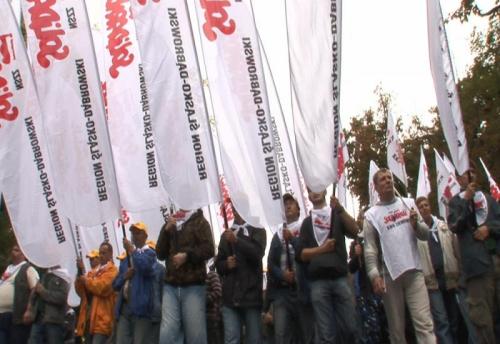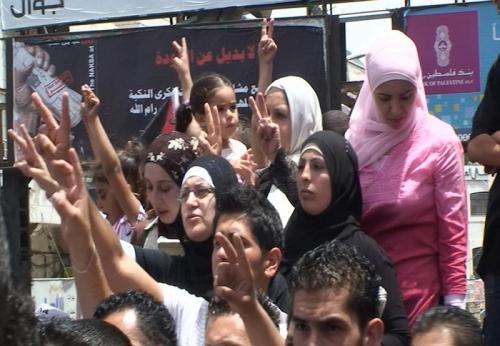The Polish artist Artur Zmijewski has collected twenty short documentary films under the heading ‘Democracies’. As one watches these films over two hours and twenty-six minutes, this heading initially makes sense. All the films deal with forms of public gathering, indicating some shared degree of collective will. Yet the relationship between the films and the notion of democracy seems problematic given further thought. Not all of the films are of obviously political actions, nor do all occur within contexts, or with objectives that can be considered democratic in any obvious sense.
Nine of the films were made in Poland. Three of these are of overtly political demonstrations in Warsaw. One is a feminist demonstration (the 10th Annual Women’s Day Manifestation) at which speakers demand an end to violence against women, proper women’s health care, and the limitation of clerical influence over the government around issues of sexual equality. Zmijewski also filmed the small rightwing counter-demonstration to this event at which calls for greater abortion rights for women are equated with Nazism and the Holocaust. A second demonstration is organised by the Solidarity Union that demands better living conditions for Polish workers and a third is a demonstration of Catholics against current Polish legalisation on abortion.

Solidarity Demonstration, Warsaw. Artur Zmijewski ‘Democracies’
The other films made in Poland represent the public funeral of the Polish Health Minister (Zbigniew Religa), a procession of ‘The Way of the Cross’ through Warsaw, the reading of a letter from the Polish episcopacy on the matter of artificial insemination in a Warsaw church, two re-enactments of battles during the Warsaw uprising against the German occupation in 1944, and the parade and picnic of the ‘Feast of the Polish Army’. None of these events appear to relate to political practice in an overt way, though the reading of the episcopacy letter borders on this in that it involves an intervention on the part of the church into the field of biopolitics. Sexual reproduction and control over women’s bodies are significant issues of political debate within Poland, with leftists and women’s organisations presenting a strongly pro-choice agenda, the church and the right calling for a ban on abortion, and ‘moderates’ supporting the current law established in 1993, that constitutes a compromise position allowing abortion, but only when pregnancy is the result of a criminal act, when the foetus displays gross abnormalities, or when the life of the woman is under threat. In this context both the reading of the episcopacy letter and even the procession of ‘The Way of the Cross’ might be seen to constitute forms of political action within the public sphere because they involve the assertion of the authority of the church within this space. Yet even if one is able to suggest that the procession of the ‘Way of the Cross’ relates to broader public political debates, it is difficult to extend such a proposition to the films of Zbigniew Religa’s funeral, the Warsaw Uprising re-enactments, and the ‘Feast of the Polish Army’. This point also applies to two films made in Germany of football supporters in Berlin during and after a European Championship match between Germany and Turkey, and of the memorial ceremony for the 16 victims of Tim Kretschmer’s shooting spree at the Albertville School in Winnenden in March this year.
What this means is that some of the films are obviously political in content, while others are not. Yet even those films that address a distinctly political subject are not obviously about democratic acts and concerns. This is particularly the case when it comes to understandings of democracy based upon notions of equality. For example, there is Jacques Ranciére’s conception of democracy as a condition that only emerges when the status quo (or in Ranciére’s terms, the ‘police order’) is contested through collective action premised upon the principle of equality. In relation to this understanding of democracy, Zmijewski’s films of demonstrations against the Israeli occupation in the West Bank appear to represent something appropriately democratic. The Palestinian people of the West Bank village of Bil’in do not live in a democracy of even a liberal kind. Rather they are ruled through military law by a state that denies them the suffrage and citizenship that it gives to Israeli citizens living within the Green Line and to Jewish settlers within the West Bank itself. Nevertheless, the coming together of Jewish Israeli activists and Palestinians in Bil’in to protest against the West Bank Barrier filmed by Zmijewski constitutes a moment in which the ethnocentric logic of the occupation is contested and a partial sense of equality is created. However this kind of democracy is certainly not present in the demonstrations filmed in Poland that relate to the Catholic Church. The people in these demonstrations occupy public space, but they are doing this not on the basis of equality, or with the purpose of contesting the legitimacy of the politically given, but rather on the basis of their subjection to the edicts of the Polish episcopacy. Even the demonstration in Bil’in is structured by an inequality between Jewish Israeli activists and the Palestinian villagers with whom they declare solidarity. Indeed, one practical role of the former is to provide a degree of protection to Palestinians from the sovereign violence of the Israeli state. As the Israeli artist David Reeb, a regular at the Friday demonstrations in Bil’in, who also appears at the end of Zmijewski’s film of the demonstration in the village, once observed in conversation: ‘People [meaning Jewish Israelis] don’t like it when the army shoots Jews.’

Nakba Day, Ramallah. Artur Zmijewski ‘Democracies’
These points suggest that the theme of the democratic is hard to pin down in the films that constitute ‘Democracies’. So where might we focus our attention to understand what Zmijewski’s films present if the democratic principle is not altogether intelligible within them as a whole? I would suggest focussing upon two things emphasised by the films: first, the continuing significance of nationalism within contemporary politics, and second, the almost theatrical nature of many public gatherings and demonstrations. Zmijewski shows us German football supporters, who chant ‘Germany, Germany’ and ‘This is who we are’, as if they are under the assumption that they are able to tap into some essence of German-ness, instead of actually generating this condition through these very declarations. In other films we are presented with rightwing Israelis demonstrating in Tel Aviv in support of the impending IDF operation in Gaza denouncing leftists demonstrating against the attack as people who do not really belong to the Israeli nation and Loyalists attending a march marking the 399th anniversary of the Battle of the Boyne in Belfast, telling Zmijewski himself to ‘fuck off back to Poland’. Here we have examples of the exclusiveness fundamental to the national imaginary: some people are taken to belong, others are not; belonging necessitates a uniformity of thought and commitment to the nation, whereas departure from this uniformity of commitment indicates a betrayal of the nation. These declarations of nationhood, despite the differences between the positions from which they are enunciated – Palestinians, unlike Israelis, Poles, and Germans, have no state that can cohere their nation in terms of a sovereign territory – all involve certain kinds of ritualised performance. They require uniforms, symbols, slogans, and modes of comportment. This also extends to those films that focus on leftwing politics, suggesting that even the most seemingly radical forms of political activism can involve things that are taken as given. The anarchists filmed smashing and burning buildings at an anti-NATO demonstration in Strasbourg are dressed the way anarchists are meant to dress and are doing what anarchists are meant to do, or at least what they think they should do to effect political change. This does not mean that such actions are just theatrical spectacle and as such pointless. Yet, there is a value to ‘Democracies’ if it can get us to think about how radical politics is itself often something that has a routine and is a matter of repeating, or re-enacting, actions that have occurred in the past. Perhaps this is the point of Zmijewski’s inclusion of the films of the re-enactments of the Warsaw Uprising?
This leads me onto the matter of the apparently contradictory relationship between the verisimilitude and seeming transparency of the individual documentary films and the resistance to easy interpretation that their combination in the ‘Democracies’ project presents to the viewer. Each film is constructed in a straightforward way and there seems to be little artifice to Zmijewski’s approach to documenting the events. Yet this sense of accessibility is lost once the viewer is forced to puzzle over how the separate films relate to each other. Zmijewski has commented that ‘[t]here is no art in these movies.’ This maybe the case, but there is art in their presentation together. And it is their presentation together that gives the overall project the characteristic of ambiguity that has been valued in much contemporary ‘critical’ art.
There are moments in the collection of films when one thinks one has been shown something that points to the overall logic of the project. For example, the final film on the ‘Feast of the Polish Army’ ends with a singer performing a song, one line of which declares: ‘The time has come, the highest time, to conquer hatred that eats our hearts.’ Is this bizarre performance the key to the meaning of ‘Democracies’? One might suggest that it is, given the apparent focus of the films on the forms of hatred and exclusion wrapped up with nationalism. Yet one is still left wondering. Moreover, it is Zmijewski’s avoidance of explicit partisanship and propagandising that seems to be the most worthwhile characteristic of his project. This strategy leads to a viewing experience that teeters between a sense that ‘Democracies’ is a bit inconsequential because of its relative unintelligibility and a condition of thoughtfulness about contemporary politics enabled by this very resistance to straightforward interpretation.
‘Democracies’ will be shown at the Cornerhouse in Manchester on Friday 27th November 2009.
Leave a comment